Publications Search Results
Our Publication Search Results
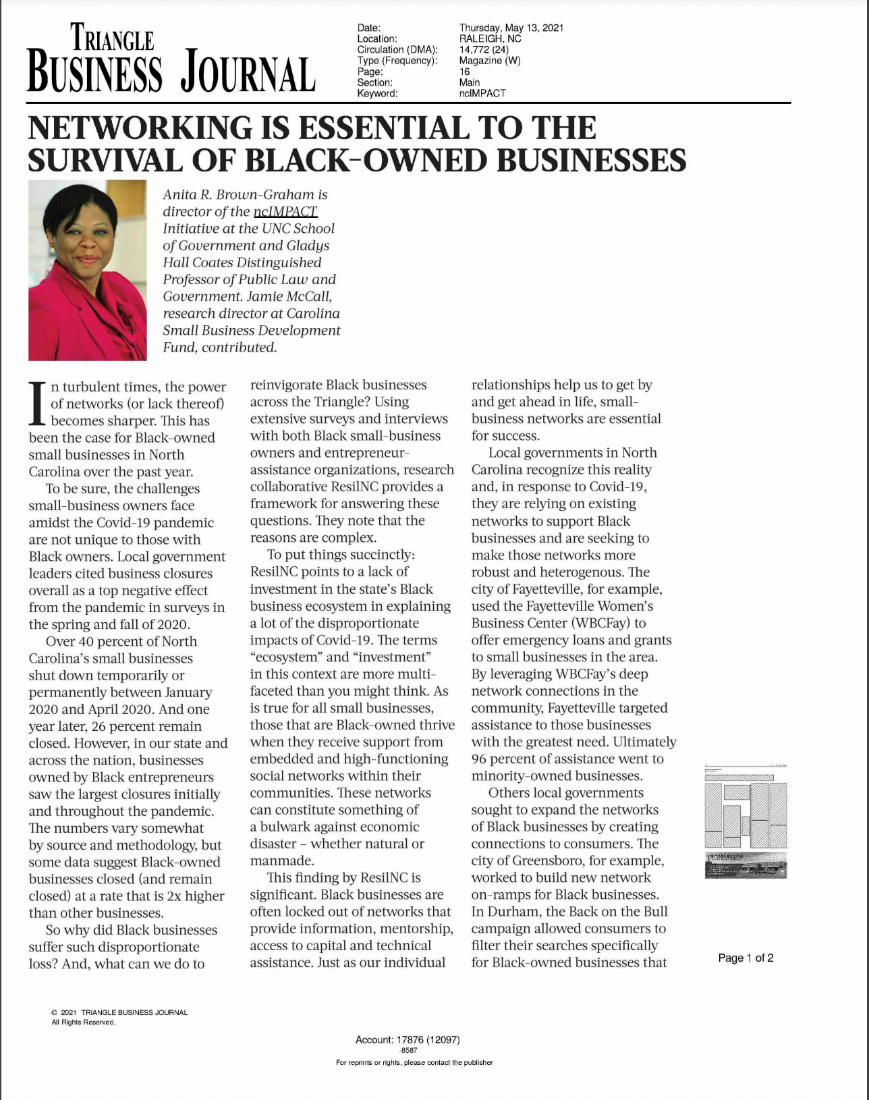
Networking is Essential to the Survival of Black-Owned Businesses
05/13/21“So why did Black businesses suffer such disproportionate loss? And, what can we do to reinvigorate Black businesses across the Triangle? Using extensive surveys and interviews with both Black small-business owners and entrepreneur-assistance organizations, research collaborative ResilNC provides a framework for answering these questions. They note that the reasons are complex.”
…
Continued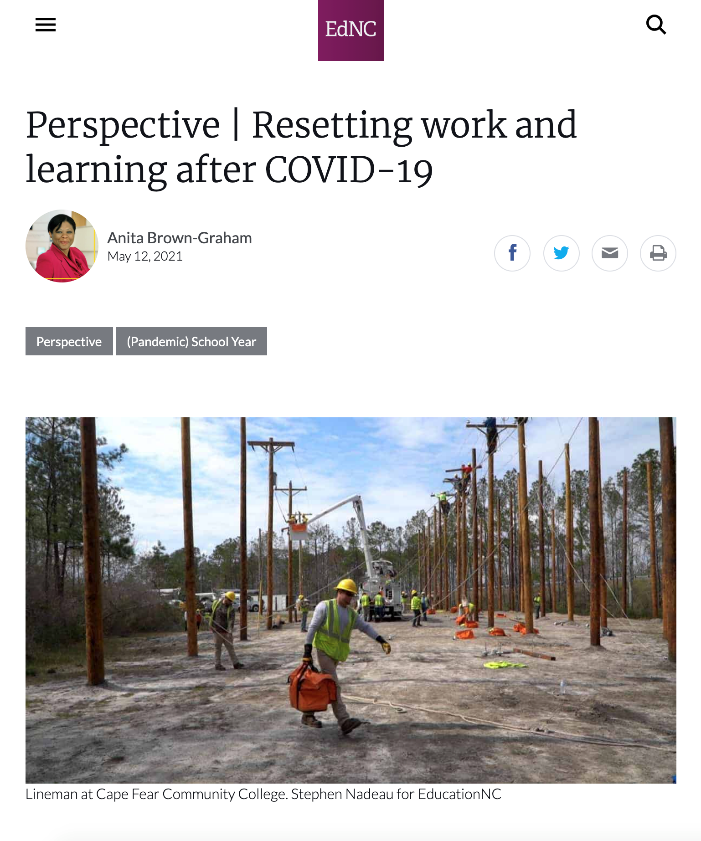
Perspective | Resetting work and learning after COVID-19
05/12/21“The predictions are of great concern for all students, but we know that some will be more disproportionately impacted by learning loss. Underserved students have been even more underserved during the pandemic. We need an acceleration plan.”
…
Continued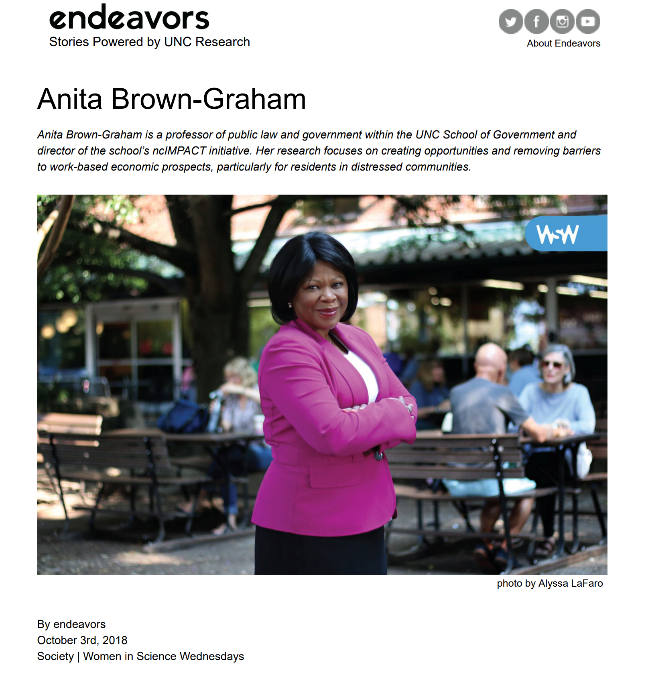
Spotlight on Anita Brown-Graham
10/03/18“There was no choice but to pivot and, on the spot, devise a constructive way to explore why people thought things were not better when the economy had been more robust and, more importantly, why they saw no prospects for progress. We went on to have a productive strategic visioning session and the community has made great strides in creating new economic engines.”
…
Continued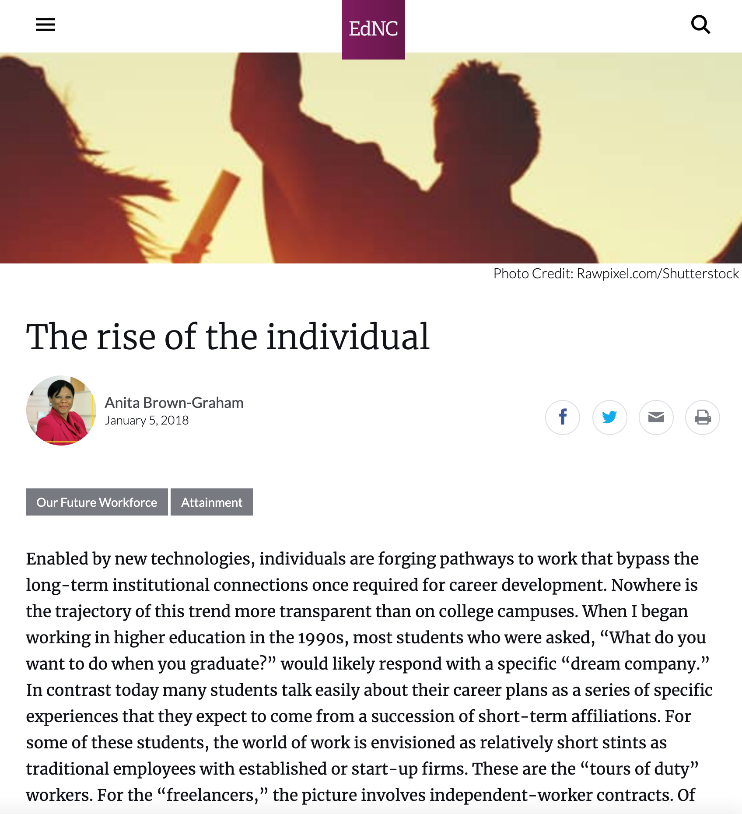
The Rise of the Individual
01/05/18“A new social contract is developing between companies and their workers, driving major changes in the employer-employee relationship. Workers want an enriching experience at every stage, rapid career growth, a compelling and flexible workplace, and a sense of mission and purpose at work. When employers fail to deliver on these employee expectations, and maybe even if they do, they can expect to see their employees leave after a few years.”
…
Continued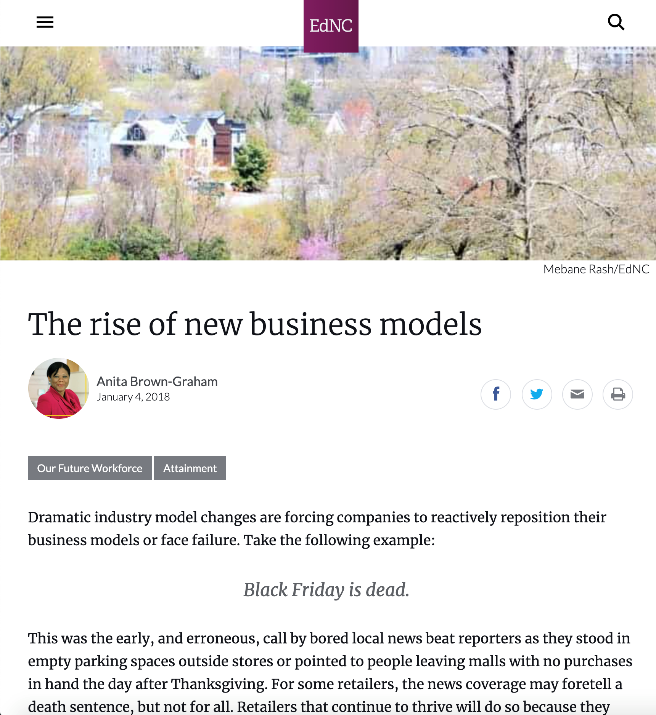
The Rise of New Business Models
01/04/18“Disruption in business is not new. We can all think of companies from our past that ceased to exist some time ago. Remember Kodak? What is different today is the pace of change. Established companies are here today and gone tomorrow. New companies appear today, and dominate the market tomorrow.
As every technology with a computing base advances on an exponential curve, we will continue to see significant disruption in almost every industry over the next decade.”
…
Continued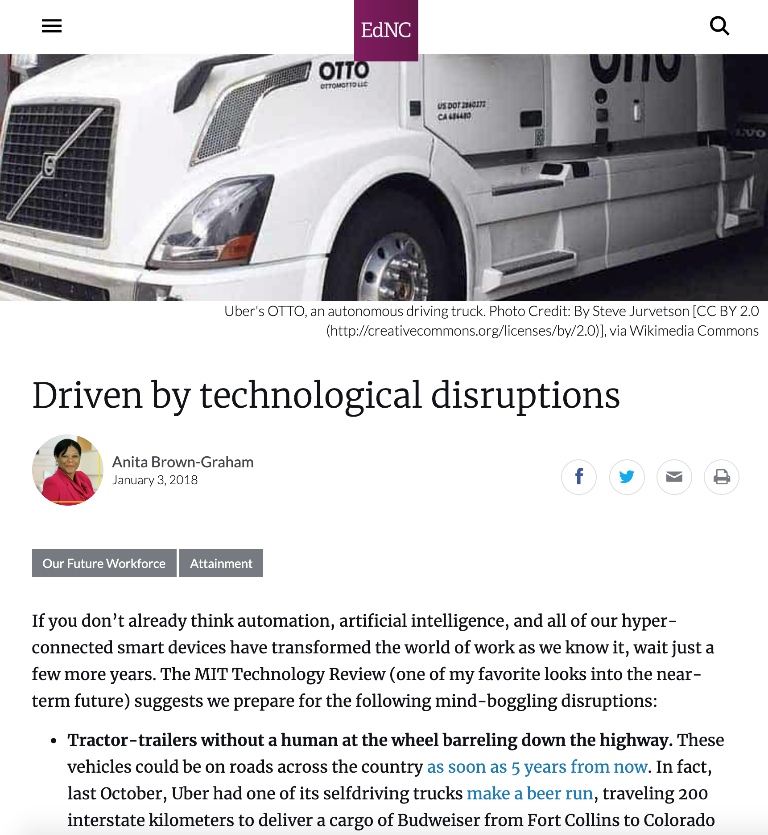
Driven by Technological Disruptions
01/03/18“A report by the World Economic Forum reveals that almost 65 percent of the jobs elementary school students will be doing in the future do not yet exist. Are we able to predict those jobs of the future? Frankly, while we may be able to project how a particular technology might render redundant certain human tasks in order to speculate about technological unemployment, it is more complicated to foresee the multiple ways a future technology may complement or create demand for existing human skills and jobs.”
…
Continued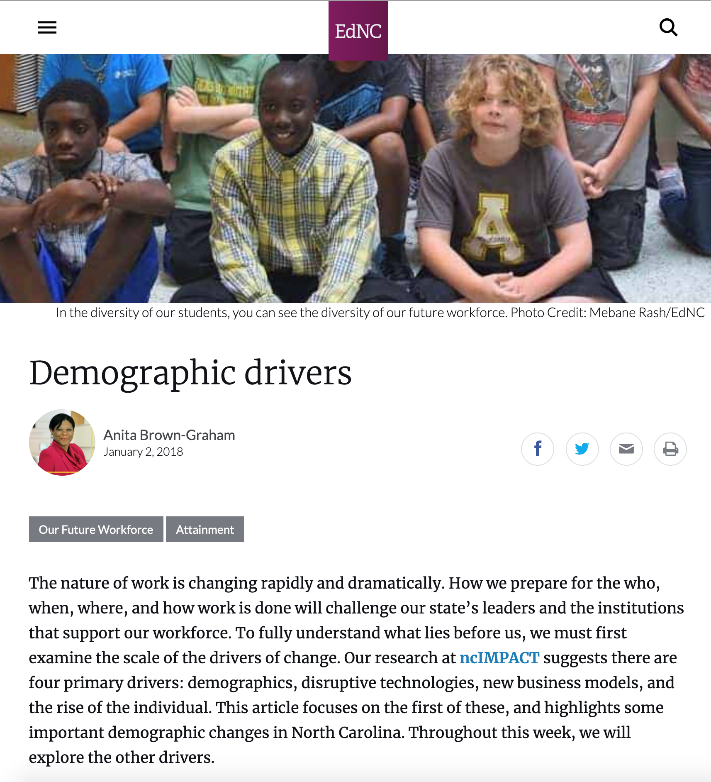
Demographic Drivers
01/02/18“North Carolina is growing. But according to demographic analysis by our friends at Carolina Demography, much of this growth follows a trend of clustering in the state’s existing population centers, and will continue to do so over the next two decades. As people increasingly reside in those areas, strong job growth tends to concentrate there, too.”
…
Continued
Tar Heel: Anita Brown-Graham Facilitates a Meeting of the Minds to Make NC a Better Place
07/02/16“Brown-Graham has the unique ability to bring diverse communities together to focus on and develop solutions for critical issues facing North Carolina,” says Randy Woodson, chancellor at N.C. State University, where the institute is based. Under her leadership, he says, the institute has “developed into an organization that continually improves the lives of citizens all across North Carolina.”
…
Continued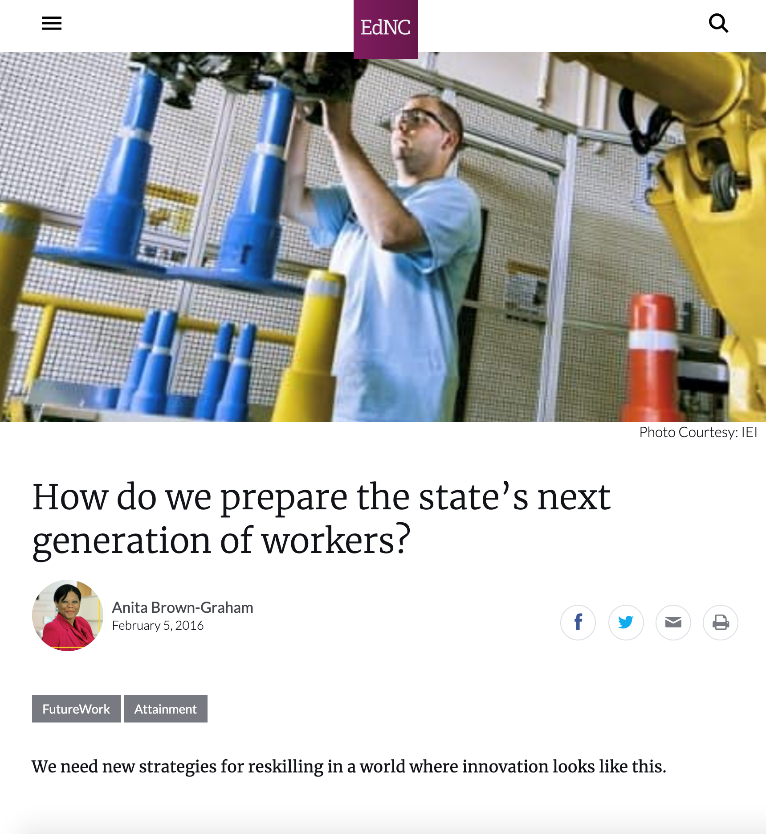
How Do We Prepare the State’s Next Generation of Workers?
02/06/16“Our challenge as a state is to identify opportunities that North Carolina must leverage today to successfully navigate the transformational employment market changes ahead. The Institute for Emerging Issues put that challenge before two groups, a Working Group of workforce and economic development organizations, industry, education systems, policy makers, current and future employees, and other key stakeholders, and Forum Ambassadors, career counseling professionals working in high schools, community colleges, universities, NCWorks Career Centers, local government workforce agencies, and community-based organizations.”
…
Continued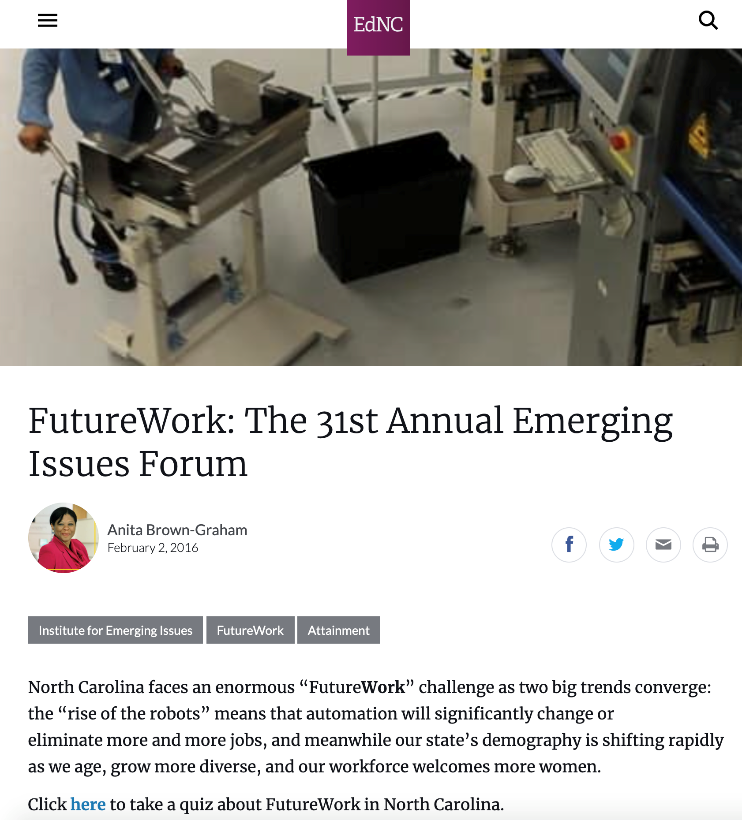
FutureWork: The 31st Annual Emerging Issues Forum
02/02/16“North Carolina faces an enormous “FutureWork” challenge as two big trends converge: the “rise of the robots” means that automation will significantly change or eliminate more and more jobs, and meanwhile our state’s demography is shifting rapidly as we age, grow more diverse, and our workforce welcomes more women.”
…
Continued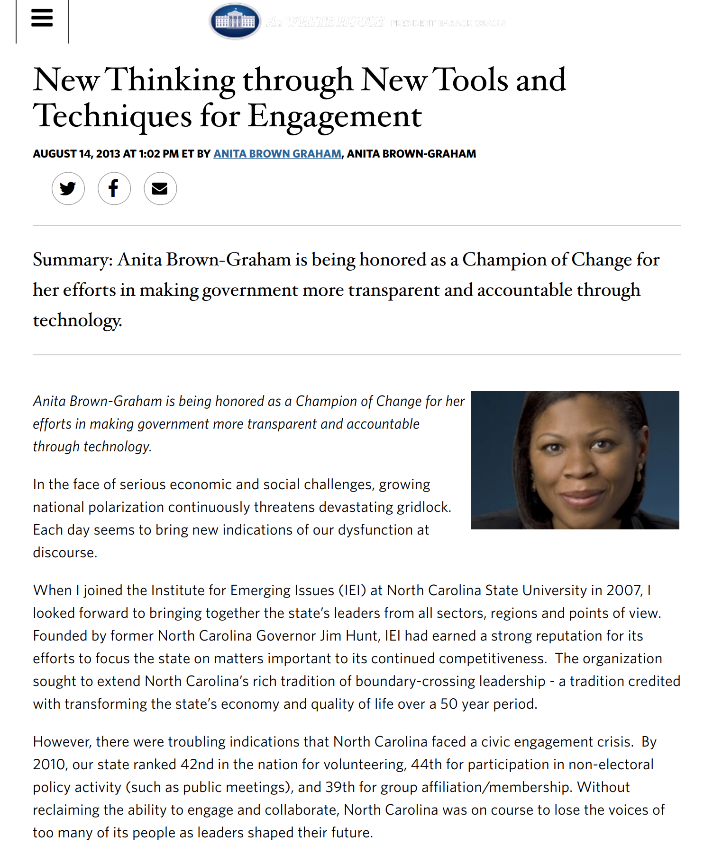
New Thinking through New Tools and Techniques for Engagement
08/14/13“IEI needed to respond to this crisis, but we could not act alone. We reached out for the wisdom of hundreds across the state. With their contributions of content, design support, software innovations and funding, we created the Emerging Issues Commons – a first of its kind engagement tool – both a physical space and an online hub that is today transforming how citizens across the state connect with each other, access information, and take collaborative action on important issues.”
…
Continued
Measures and Methods: Four Tenets for Rural Economic Development in the New Economy
10/01/08“There is no single recipe for prosperity. This is true for all rural areas, whether new economy winners or not. However, for any rural area to compete in the global economy, its development methods must explicitly address each of four pillars: innovation, investments, connections, and preservation.”
…
Continued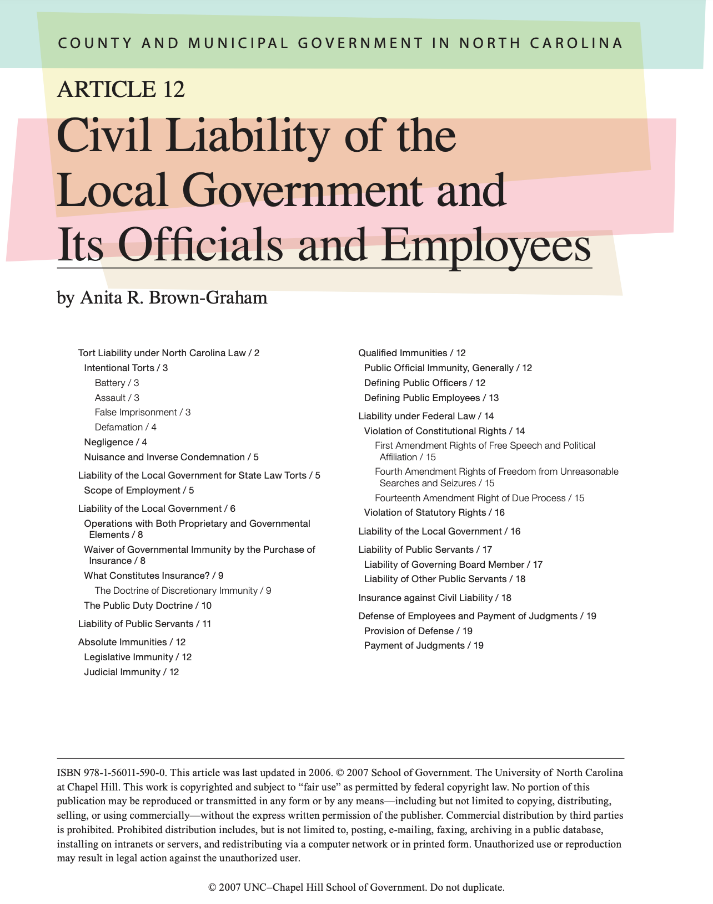
Civil Liability of the Local Government and Its Officials and Employees
07/24/07“This article deals with two basic areas of liability: tort liability under North Carolina law and liability under federal law for violations of the Civil Rights Act of 1871. … These two kinds of claims are the most common ones brought against public servants and their employers. As covered in this article, the state and federal rules governing these claims determine whether a local government and its public servants may be required to pay damages to someone harmed by official action.”
…
Continued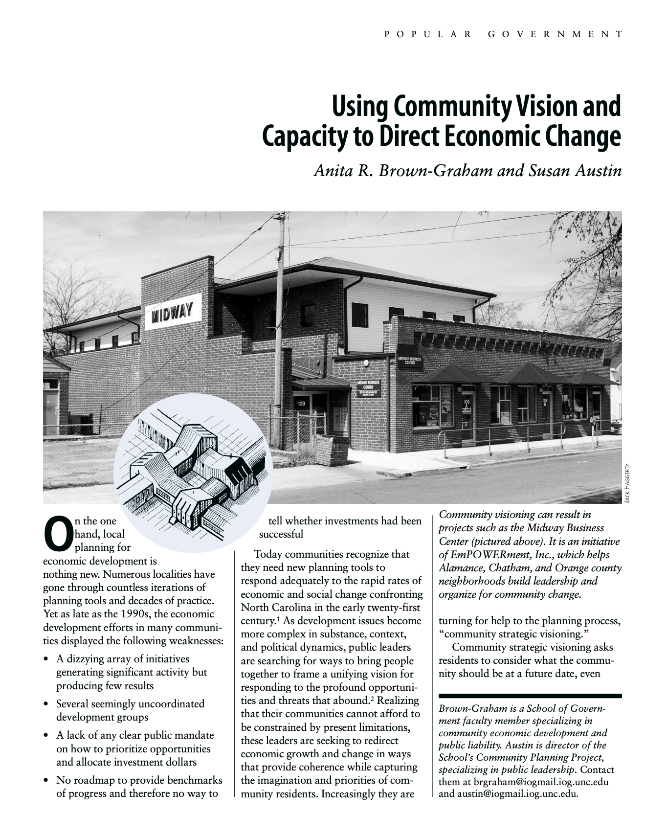
Using Community Vision and Capacity to Direct Economic Change
05/16/04“As development issues become more complex in substance, context, and political dynamics, public leaders are searching for ways to bring people together to frame a unifying vision for responding to the profound opportunities and threats that abound. Realizing that their communities cannot afford to be constrained by present limitations, these leaders are seeking to redirect economic growth and change in ways that provide coherence while capturing the imagination and priorities of community residents.”
…
Continued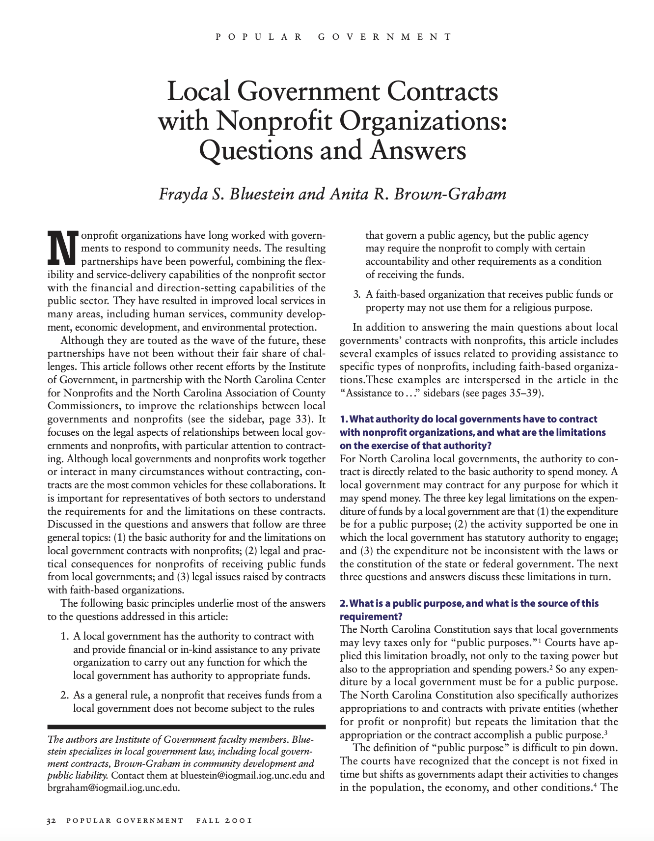
Local Government Contracts with Nonprofit Organizations: Questions and Answers
10/01/01“In addition to answering the main questions about local governments’ contracts with nonprofits, this article includes several examples of issues related to providing assistance to specific types of nonprofits, including faith-based organizations. These examples are interspersed in the article in the “Assistance to …” sidebars (see pages 35–39).”
…
Continued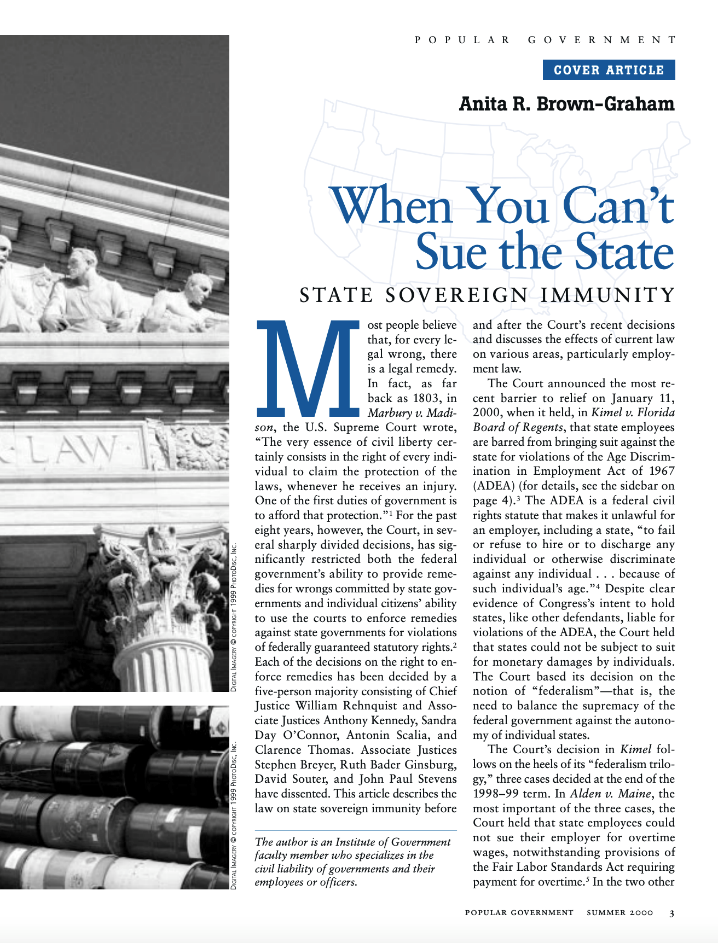
When You Can’t Sue the State
07/24/00“Controversy over the meaning of federalism is not new. In the 1700s the nation’s founders heatedly debated the need to define and protect the position of states relative to the federal government. Throughout the 1800s Southern states repeatedly invoked states’ rights in an effort to preserve first slavery and then segregation. In the 1990s and into the year 2000, the Court has again revived debate about the fundamental nature of American federalism. Yet despite a perhaps valiant effort to develop a principled and workable doctrine, the Court has generated more questions than answers by its recent decisions.”
…
Continued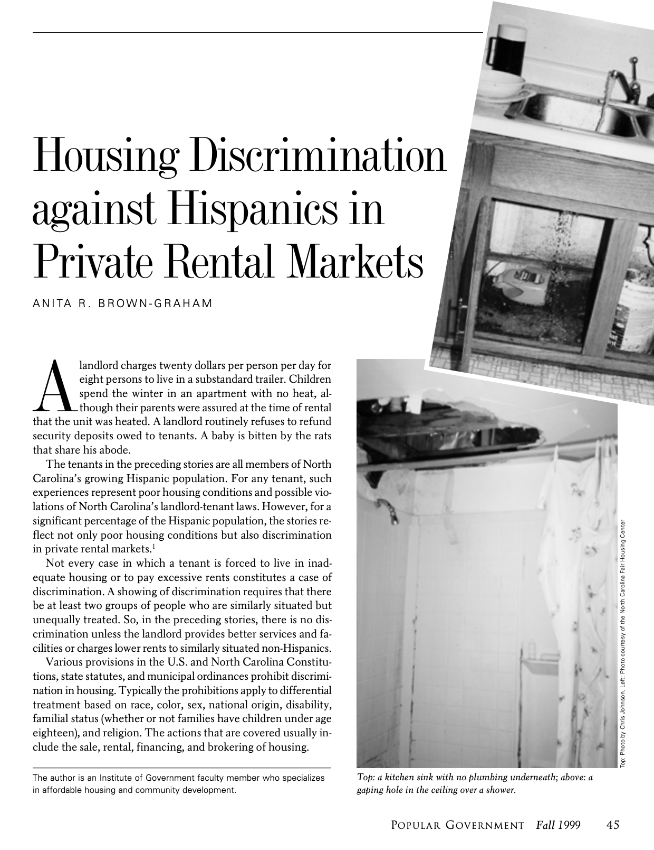
Housing Discrimination against Hispanics in Private Rental Markets
10/01/99“Race is the most frequently cited basis for housing discrimination complaints in North Carolina. African Americans make up the majority of complainants, and most of the complaints involve rental properties where property managers and landlords purposefully give misinformation about housing availability and cost to avoid renting to such people. But industry watchdogs estimate that the state’s emerging Hispanic population is the fastest-growing target of discrimination.”
…
Continued